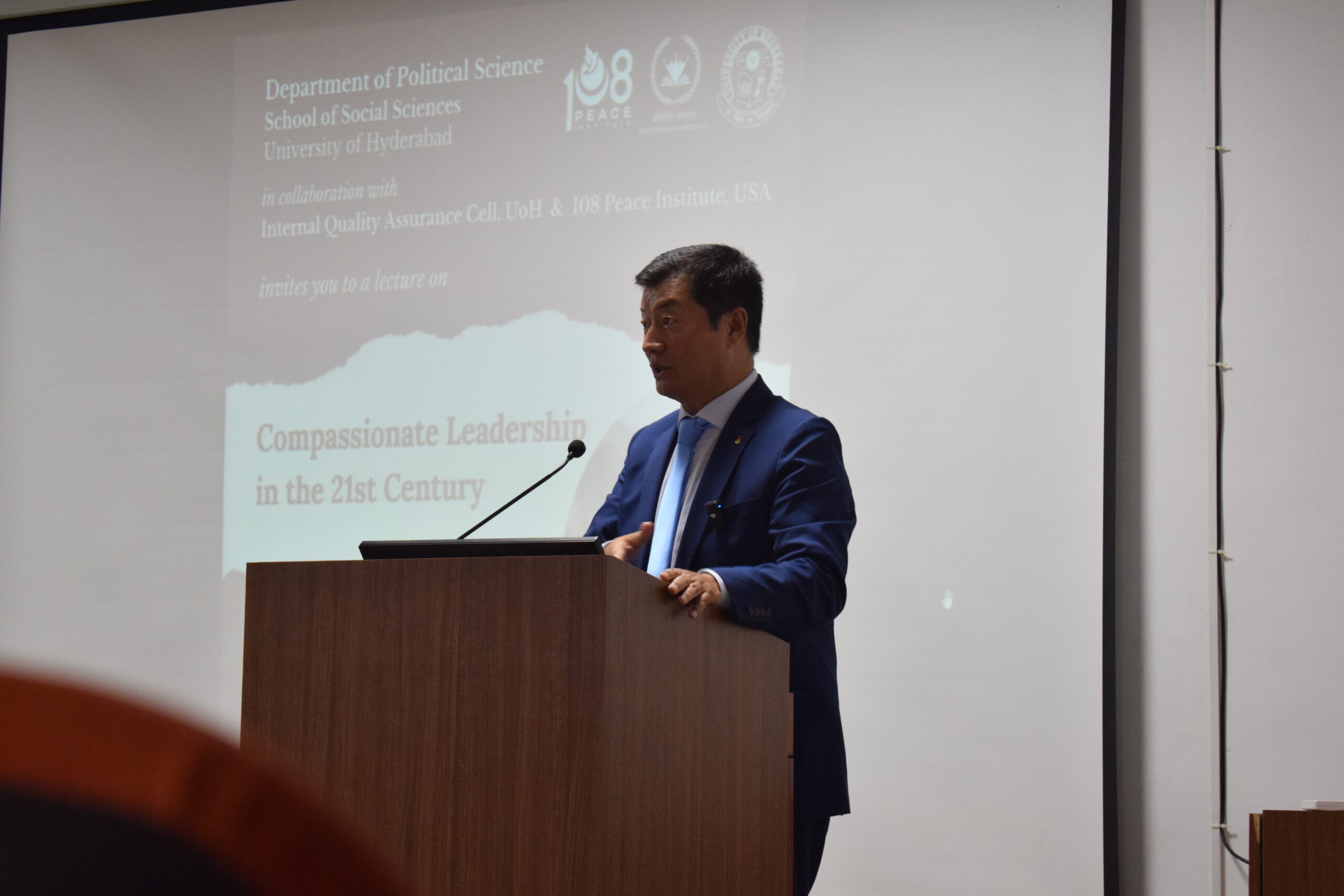September 16, 2025: In honor of the 90th birth anniversary of His Holiness the Great 14th Dalai Lama of Tibet (Goton), the 108 Peace Institute, in collaboration with the Department of Political Science, School of Social Sciences, University of Hyderabad (UoH) and the Internal Quality Assurance Cell (IQAC) (UoH), hosted a lecture session on “Compassionate Leadership in the 21st Century.”
The Lecture session featured Dr. Lobsang Sangay, senior visiting fellow at the East Asian Legal Studies Program, Harvard Law School and founding president of 108 Peace Institute. Professor Jyotirmaya Sharma of Department of Political Science (UoH) introduced the speaker and chaired the lecture.
Dr. Sangay opened the session by sharing his remarkable life journey—from his early years as a refugee child in Darjeeling to his tenure as the Sikyong (President) of the Tibetan Government-in-Exile (Central Tibetan Administration) from 2011 to 2021. He highlighted how his close association with His Holiness the Dalai Lama profoundly shaped his personal and political philosophy.
Reflecting on his personal journey, Dr. Sangay articulated the belief that compassion is a necessity, not a luxury. He shared how compassion enabled him to face challenges and criticism with resilience, and how it serves as a powerful catalyst for peace and positive change—both individually and within society. His decision to lead the Tibetan Government-in-Exile for over a decade, despite the high opportunity cost of leaving behind a promising career, was deeply rooted in this principle. “Compassion is not merely sympathy but an actionable desire and willingness to help others bring out of suffering “, he remarked.
He also recounted the challenging journey behind the passage of the Tibetan Policy and Support Act (TPSA) 2020 in the United States, which occurred at the height of the COVID-19 pandemic. Despite global travel restrictions and shutdowns, he undertook international visits and advocacy efforts to garner bipartisan support for the bill. “Courage, when guided by compassion, will propel you toward your goal, no matter the odds,” he said. Dr. Sangay highlighted that the U.S. government now formally recognizes the Central Tibetan Administration (CTA) as the legitimate institution representing the aspirations of the Tibetan diaspora and acknowledges Sikyong as its President.
Illustrating His Holiness’s ethical commitment, Dr. Sangay shared the story of how the Dalai Lama declined to receive the COVID-19 vaccine early in January 2021. Instead, he waited until it was available to all 1.4 billion Indians and received it at a local hospital—choosing equality over privilege. Additionally, Dr. Sangay introduced the Social, Emotional, and Ethical (SEE) Learning curriculum drafted by Emory University under His Holiness the Dalai Lama’s guidance. The curriculum promotes moral and emotional development alongside academic learning. Currently taught in 42 countries and translated into over 20 languages, SEE Learning has reached 20 million students worldwide. In India, the program is actively implemented in schools across Rajasthan, supported by the Piramal Foundation. Dr. Sangay echoed the concern of His Holiness the Dalai Lama that modern education focuses heavily on material gain while neglecting moral and emotional development leading to rising global mental health crisis, social instability, and conflict.
Likewise, another key highlight was on the Buddhist philosophy of “equanimity,” finding balance during adversities and heightened success, as an essential ingredient of leadership across political systems.
Responding to questions, Dr. Sangay reiterated His Holiness’ July 2025 statement affirming that he will reincarnate, but his next birth will take place in a free country, a declaration also recorded in the book Voice for the Voiceless. He strongly criticized the Chinese Communist Party’s attempts to interfere in this spiritual matter, stating, “Reincarnation is a deeply personal and sacred decision. No political regime has the legitimacy or spiritual authority to control it.”
The session inspired many thought-provoking questions from the audience. Dr. Bhim Subba, a lecture coordinator, thanked Dr. Lobsang Sangay, Prof. B. J. Rao, UoH Vice-chancellor, and the IQAC for their guidance and support, and other members of the audience. The session was attended by around 80 students and faculty members.

